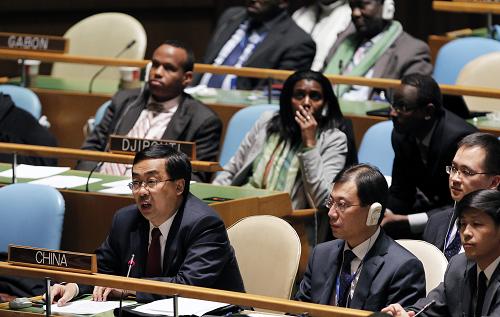The world must respect Syria's sovereignty
- By Dong Manyuan
 0 Comment(s)
0 Comment(s) Print
Print E-mail China.org.cn, February 18, 2012
E-mail China.org.cn, February 18, 2012
The United Nations General Assembly voted overwhelmingly Thursday to approve a draft resolution which strongly condemns the Syrian President Bashar Assad's cruel crackdown on domestic uprising and calls for his resignation. Only a small number of countries, including Russia, China and Cuba, voted against the measure.
|
|
|
China opposes armed intervention or forcing a so-called "regime change" in Syria, China's deputy permanent representative to the UN Wang Min said on Feb. 16, 2012. [Xinhua] |
This resolution shows no differences from a similar one vetoed in the Security Council earlier this month. Indeed, both of them challenge the legality of Assad's regime. However, it should be noted that it's impossible to forge basic and favorable conditions for stopping violence - especially if the proposal only sets requirements for Assad's government but has no equal demands over the anti-government armed forces opposing him. Therefore, the new resolution will have no effects in re-establishing domestic stability for Syria, advancing its national reconciliation, cooling down factional tensions, or resolving other Syrian issue in a peaceful manner through sound political and diplomatic approaches.
The new measure was staged in line with an Arab League plan to resolve the conflict put forward on Jan. 22. However - from the Arab League plan, to the Security Council resolution submitted by Morocco but vetoed by Russia and China on Feb. 4, to the latest General Assembly resolution - none of them have really embodied or reflected the common will of the Arab countries. This is because a few countries, including the U.S., the U.K., France and Germany, have exerted great influences on the drafting process, and forcefully injected their own wills and agendas into the proposals in the name of the Arab countries.
For some countries in the world, the new resolution could help them to promote the regime change in Syria in a so-called "more legalized and rightful way," so that they can easily occupy the moral high ground without any difficulties. What they really want to achieve is to ensure America and Europe can steer the political changes in Western Europe and North Africa. They are eager to manipulate the regional political layout to consolidate the implementation of their strategies in the Middle East and snap up advantages in their own interests. This is the truth behind their action on this issue.
China has already used its veto power twice in the Security Council's voting of the intervention in Syria prior to its rejection again Thursday. China, as a country which pursues a foreign policy of peace and non-intervention, has always made independent decisions based on the merits of individual cases. It never sits on the fence, hops onto the bandwagons, or acts in accordance with the wills of other powers. What China seeks is to find solutions through dialogue and consultation with a goal of maintaining international and regional peace, stability and development. Every time when there is a need to maintain the world's peace, China will, in no hesitation, take action to support justifiable rights of those countries involved.
There are still other ways and opportunities to solve the conflicts in Syria. China calls for the negotiation and communication among the Syrian parties and a stop to all violent activities through restrains on both sides, thereafter enacting the constitution for the election in Syria. It seems that the Western countries intend to vote for the resolution with the so-called wills of Arab League. This will kill the ways and opportunities for solving Syria crisis, so China does not agree with this.
China advocates that the role of the Arab League and Arabian countries in mediating negotiations in Syria should be respected, including their appeal of stopping the violent activities, protecting the civilians, providing humanitarian aid for Syrian people, and preventing military interference from the outside. China is willing to communicate and cooperate with the Arab League and Arabian countries and to coordinate with the Syrian government and parties, including the opposition party.
China's Vice Foreign Minister Zhai Jun has set out for Syria to play a constructive role in dealing with the crisis, holding a peaceful dialogue to reach an accommodation that can be accepted by all the parties. Syria's independence, sovereignty, territorial integrity and national solidarity should be respected by the global community. Unfortunately, these opinions and appeals from China were not respected or echoed by enough countries, forcing China to use its veto power.
There was no private interest China is involved for voting against the proposal or for the cooperation with the Arabian countries. The relationship between China and the Arabian countries is based on equality. China treats every country equally, no matter their size or national strength. China respects the choices that the Arabian people make on their own systems, development routes and patterns, and is opposed to any external power that interferes with the domestic affairs of Arabian countries. China always stands with Arabian people to support the Palestinian people regaining their rights to build their own country.
Dong Manyuan is the vice director and research fellow with China Institute of International Studies.
This article was first published in Chinese and translated by Xu Lin and Zhang Junmian.
Opinion articles reflect the views of their authors, not necessarily those of China.org.cn.







Go to Forum >>0 Comment(s)